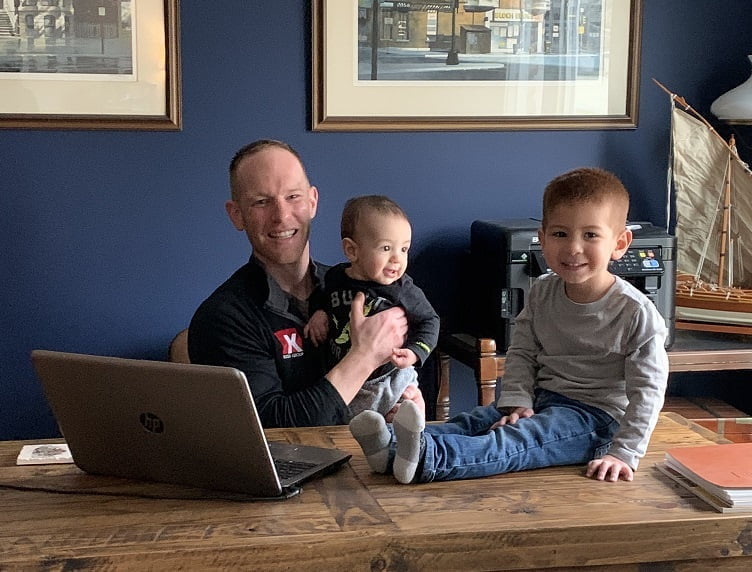04.02.20
REJournals: Doing business in the new normal: CRE pros adjusting to life during COVID-19

As governors across the country continue to issue shelter-in-place orders, the commercial real estate industry is shifting to work-from-home mode. Brokers and developers are setting up home offices, answering their kids’ math problems and taking phone calls in spare bedrooms and back porches.
How are CRE pros handling this shift? The ones we spoke with? They’re handling it well.
Yes, there are challenges both with working from a crowded home or a cramped apartment unit. But the CRE industry has long been a mobile one, with professionals spending long hours in their cars, on their phones and in front of computer screens. Because of this, the professionals in this business are well-suited to work from just about anywhere.
And that’s something that’s paying off today.
Duane Lund, chief executive officer of NAI Legacy in Minneapolis, said that commercial real estate brokers have long been skilled at working from remote locations. Brokers don’t spend long hours sitting at their desks in an office.
That has made the transition to working from home an easier one.
Lund points to a recent conference call with NAI Global. About 100 principals from NAI offices across the country were on the phone, and all of them said they were adjusting to this new normal, working just as efficiently from their home offices as they were from the NAI offices dotting the country.
This doesn’t mean, though, that COVID-19 hasn’t changed anything about the day-to-day life of CRE brokers. Lund said that he already misses the face-to-face interaction with brokers, clients and developers.
“As an older guy, I still like being in the room with the players,” he said. “The younger people in this industry have long been mobile. They are perhaps a bit more comfortable operating in this environment. Will this become a trend, having more of the commercial real estate industry operating on a mobile basis? It already was a trend before this happened.”
This trend of remote work isn’t necessarily a positive for everyone, of course. The owners and landlords of office buildings, especially suburban ones, might wonder how difficult it will become to find tenants if companies continue to allow a significant chunk of their workforce to operate from home offices.
As governors extend shelter-in-place orders for their states, a growing number of companies might discover that it’s cheaper to let their employees spend more time working remotely. And while that might boost the bottom lines of some businesses, it could hurt the office market.
“It makes it pretty scary if you are a suburban office landlord,” Lund said. “This is a challenging time for them.”
Michael Klisanich, managing director of investments with NAI Legacy, said that while he’s comfortable working remotely and has slipped easily into the current work-from-home world, commercial real estate can never become a business conducted solely over the phone or through email and video conferences.
“There will always be a need to have people sitting in a room together,” he said. “You have more efficiencies that way. For now, though, transitioning to working from home hasn’t been that difficult. We are doing conference calls and Zoom meetings. These things were happening already anyway. We have long seen tech playing a bigger role in how business is getting done. Yes, we miss the face-to-face interactions, but we can still get business done.”
For Brian Netz, senior managing director in the Minneapolis office of Newmark Knight Frank, said that he, too, has adjusted quickly to the new normal of the working world. It helps that he specializes in industrial real estate. That’s one sector that should remain stable, even as the economy struggles as the country battles the pandemic.
People are still ordering products, so companies still need to ship them across the country. And people still want their products to arrive at their doors quickly. Distribution centers, then, remain an important cog in the U.S. economy.
Netz pointed to a week in late March as an example: He was still busy fielding calls about industrial properties in his market. He did have one deal put on pause because of the COVID-19 virus. But having one slowed deal isn’t anything unusual, he said.
“How often is a deal put on pause? The answer is, ‘all the time,’” Netz said. “Deals are put on pause every year, regardless of the market or the economic conditions.”
But what about the logistics of working from a home that is suddenly crowded with spouses and children whose school years have been put on hold? Taking calls, participating in video conferences and closing deals can be a challenge when children need help deciphering their algebra and a spouse is burning French toast in the kitchen.
Amy Galvin, managing partner of Chicago-based Luxury Living Chicago Realty, said that she has arranged her home office so that she can juggle the dual roles of earning a living and serving as an emergency teacher. She’s moved her home office to the same spot that her children are using as their makeshift school room.
“That way, I’m able to do work and be accessible to answer a question from my kids and keep them moving forward with lesson plans,” Galvin said. “I’m looking at this as an opportunity to show my daughters how to lead and adapt to the unexpected.”
This hasn’t always been easy. Galvin says she’s had to pause during video conferences to answer a question about schoolwork or tell her daughters that, yes, they can have that snack they’re craving.
“On the reverse, these actions are showing my team my humanity,” Galvin said.
Noah Birk, partner with Chicago’s Kiser Group, said that much of his workday — such as the long hours on the phone — hasn’t changed.
But that doesn’t mean there aren’t challenges. Like many CRE pros, Birk is working in a home that isn’t always the quietest.
“A big portion of my day revolves around being on the phone, so that hasn’t been too big of a transition,” Birk said. “But limited in-person client interaction has been an unusual adjustment. Also, having a 2 year-old personal assistant ‘help’ with every aspect of the day, isn’t quite as helpful as you’d think.”
Brad Weiner, managing principal of Chicago’s National Apartment Partners, said that the unknowns associated with COVID-19 can cause stress. As he says, no one knows when the spread of the virus will slow or when life will return to some semblance of normality in the United States.
But Weiner is hopeful that the negative impacts of the virus will be relatively short-lived, and that the commercial real estate industry and the U.S. economy will emerge on the other end of this pandemic poised for a quick recovery.
Weiner said he is optimistic that the asset class in which his firm owns and operates, multifamily, will remain relatively stable during the challenging days of the pandemic.
“The positive is that many of our tenants are now working from home and using their apartment as their office,” Weiner said. “There is also less turnover now because most renters are not looking to move during this pandemic. The negative is the short-term challenge for rent collections for anyone who has lost their income during this challenging time.”
